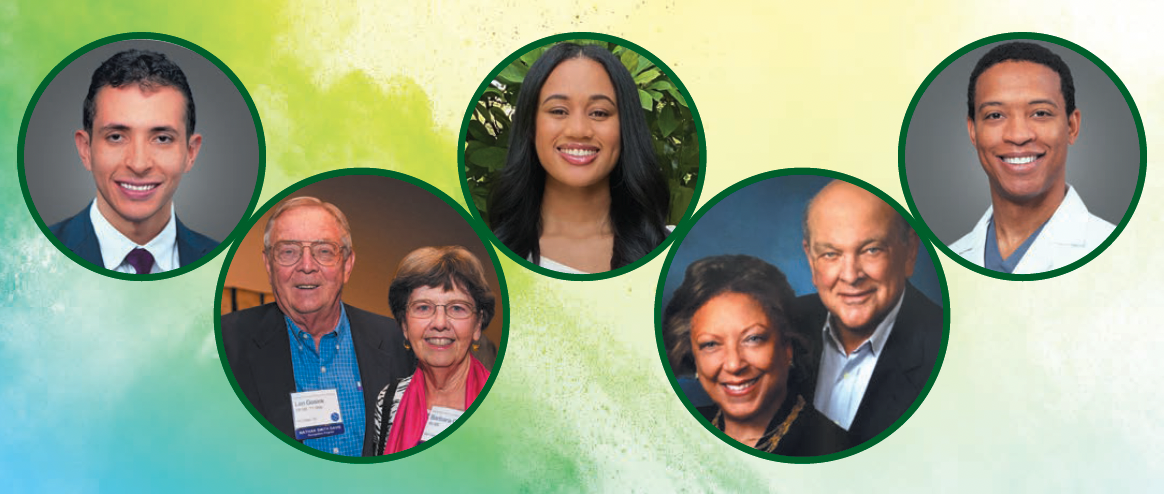Feinberg Promise Scholarship Encourages Students from Groups Underrepresented in Medicine
March 8, 2022

Above: Dr. Javier Suarez; Drs. Leonard and Barbara Gosink; current Promise Scholar Kai Brady; Dr. Bruce Peters and Mrs. Aulana Peters; Dr. Berkley Davis.
This story was published in the March 2022 issue of The Philanthropist, a newsletter for supporters and friends of Northwestern University Feinberg School of Medicine. Read the whole issue here.
Medical school is challenging for anyone, with its rigorous curriculum and hectic schedule. But for many considering this path, it comes with even more worries: Will I belong? Will I have classmates and mentors who understand my background and experiences to help me succeed? Add in the potential of a daunting debt load, and some decide it’s not feasible to pursue their dream of a career in medicine.
To help alleviate these worries and encourage students from groups traditionally underrepresented in medicine to apply to Feinberg, former medical students Javier Suarez, ’19 MD, and Berkley Davis, ’20 MD, established the Feinberg Promise Scholarship (originally called the Diversity in Medicine Scholarship) in 2019. Since then, 75 donors have contributed more than $200,000 in outright gifts and $2 million in estate gifts to support this important cause. The medical school’s ultimate goal is to build an endowment of $10 million for the Promise Scholarship so as many students as possible have access to the high-quality medical education offered at Feinberg.
The medical school strives to train a student body that mirrors local communities, with students representing a wide variety of racial, ethnic, religious, gender, and sexual identities, persons with disabilities, and socioeconomic diversity. About 22% of Feinberg’s MD Class of 2025 is from racial and ethnic groups traditionally underrepresented in medicine.
“Scholarship funding helps relieve students of financial stress and, at the same time, will help Feinberg attract awesome applicants who may not otherwise have applied,” explained Dr. Suarez, who is now a neurology resident at Brigham and Women’s Hospital in Boston. “Scholarships make the seemingly impossible possible for many students,” added Dr. Davis, a resident in obstetrics and gynecology at the University of Virginia. He grew up in a rural part of that state where friends and family didn’t consider careers as physicians. “The transition to Feinberg was tough.”
Donors Bruce Peters, ’64 MD, and Aulana Peters believe that educational opportunities are the best tools for helping young people of all backgrounds realize their potential.
“We both came from modest circumstances and were the first in our immediate families to attend college,” shared Dr. Peters. After earning his medical degree at Northwestern, he worked at the Center for Communicable Disease Control, the US Public Health Service in Latin America and Africa, and, ultimately, as a pediatric nephrologist in Los Angeles. Mrs. Peters, a retired lawyer, was the first Black person and the third woman appointed to the US Securities and Exchange Commission.
As mentors and philanthropists, the couple hopes to empower students of color to succeed.
“While earning a college degree—or a medical degree—is not the only route to personal development and achievement, it is certainly one that has been proven over time and generations to be a path to meaningful change in the social and economic circumstances of the underserved and underrepresented,” Mrs. Peters said. “This belief drove our decision to make a substantial donation to Feinberg’s Promise Scholarship.”
Leonard Gosink, ’65 MD, ’71 GME, and Barbara Gosink, ’66 MD, experienced their own financial struggles as young medical students, but they made it through thanks to scholarship support.
“Barbara and I were given considerable assistance from Northwestern and are very grateful for that—we couldn’t pay much,” said Dr. Leonard Gosink, who went on to practice neurology while his wife practiced radiology, both in the San Diego area. “I envision the possibility that Northwestern would select the class need blind: based on quality and grades and not consider whether students can pay or not. Those who can afford to pay do so and those who cannot get scholarships.”
The Gosinks have documented a large planned gift through their trust to support the Promise Scholarship that will assist Feinberg students for years to come.
The current Promise Scholar, Kai Brady, is a first-year medical student who grew up in the south suburbs of Chicago before attending a historically black college and then graduate school in Atlanta. She decided to become a doctor after witnessing the compassionate and evidence-based care her mother received at Northwestern Memorial Hospital years ago.
“I felt like my dreams had come true when I received my acceptance at Feinberg, but I only celebrated for a moment before I became anxious about how I would pay. Your gift has made my dream a reality,” Ms. Brady wrote to all the alumni and friends who supported her scholarship. “I am incredibly thankful for the opportunity to explore my interests at an amazing institution like Northwestern without a tremendous financial burden guiding my decisions.”
Already Ms. Brady is giving back—through her time—to carry on the mission of the Promise Scholarship. She is volunteering on a student admissions committee to increase diversity within the medical school.
For more information about supporting the Feinberg Promise Scholarship, please contact Larry Kuhn at 312-503-1717 or larry-kuhn@northwestern.edu.